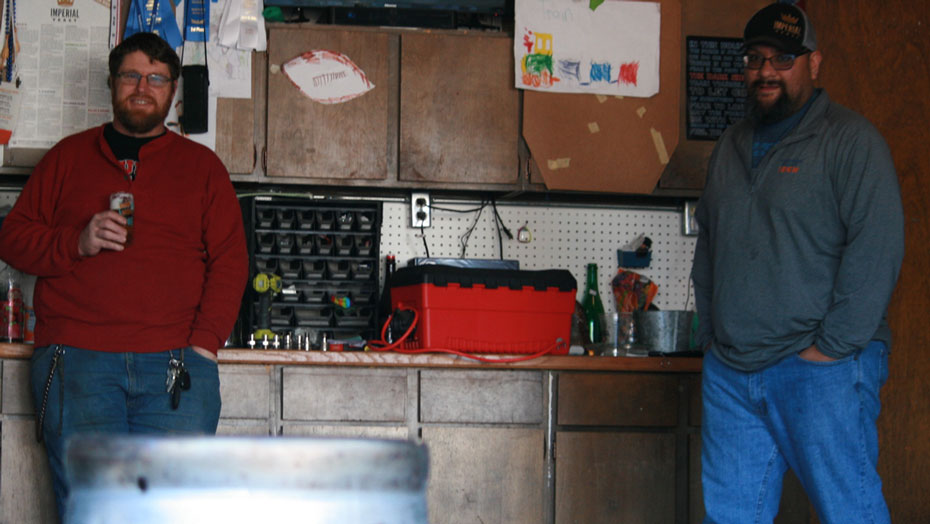
Malheur Masher Daniel Strawn (left) and Ted Martinez are members of a local club that aims to bring beer brewers together to share ideas and gather feedback. (The Enterprise/Kristine de Leon).
ONTARIO – Many people have their go-to bar or favorite drink, but for Ontario-born Ted Martinez, finding his favorite beer takes him closer to home.
Martinez is part of the Malheur Mashers Brew Club, a group of about 20 home brewers who meet regularly to share recipes and tips.
“The club just started from a bunch of people wanting to be better brewers,” he said. “I met some other people who also home brewed, and we just ended up meeting.”
Martinez started brewing his own beer in 2010.
His wife and sister-in-law at the time gave him a home-brewing kit for a Christmas gift.
“It also started with this gift my wife and her sister gave me. I thought, why not give it a try and see what it’s like,” he said. “I read all about it, tried it and really liked brewing.”
Since then, he has won countless competitions. His garage is decorated with medals, pins and trophies.
After he got into home brewing, Martinez said he wanted to learn more about the science behind what he was brewing and tried to find others to talk to about his results.
“I wanted to learn what I was doing. I was brewing almost every weekend in 2011,” he said. “I wanted to watch someone who knew what they were doing. I wanted to get better.”
Martinez said he tried to join a home brew club in Boise but was referred to join one in Oregon. Martinez found a welcoming home brew club in Baker City.
“I joined a Baker home brew club and they were very gracious and open-minded,” said Martinez. “It was a fun relationship. I learned a lot from them. The feedback I got really helped and taught me how to do better.”
When the Beer Valley brewery in Ontario opened up their space for local home brewers, Martinez started brewing there, where he met other local brewers.
“I went to Beer Valley, met others and started the club,” he said.
Now, a crew of residents from across the Treasure Valley make up the Malheur Mashers brew club.
To join, members just need to be 21 and have an eagerness to meet people while learning about the craft of brewing beer.
“The dynamic of our club keeps changing,” said Martinez. “We have about 20-plus members, but many of them are not that active any more. We have about five or six active home brewers.”
At meetings, members bring samples of what they have been brewing and let the others try.
They give feedback and plan challenges for the next meeting. An example would be a challenge to create a beer with certain qualities.
The hardest challenge, according to Martinez, is trying to copy American lagers like Budweiser or Coors Light.
“One of the most challenging beers to make is piss beer,” he said. “I’ve tried and tried, but I could never get it to that purity level of those big companies.”
“In the future, we want to have a food-pairing event, where we make a food dish and bring in our beers,” said Martinez. “Home brewing is also fun with cooking.”
He said the main purpose of the club is to offer home brewers the chance to get feedback from others and learn how to improve their brews.
“We want people to make the best beer they can. We try to brainstorm ways for them to try out or improve on,” said Daniel Strawn, Martinez’s good friend and fellow home brewer. “Our club is a safe place for that education and learning. You don’t realize what you could be doing wrong or that your beer is bad until you have someone else try out your beer.”
Strawn said he has learned a lot from his fellow club members.
“You don’t have a college degree to brew good beer, anyone can do it,” he said.
Strawn said brewing can be as complicated or as simple as one wants to make it.
The brewing process begins by choosing and finding the kind of grain. After crushing the grain, rinsing it and then adding oil and hops, yeast is added, and the waiting game begins. This part can vary depending on the type of beer one wants to get at the end. But after roughly 10 days, the result is flat beer.
“From there, you put it into bottles, add a little more sugar and give it 10 more days, and it will carbonate in the bottle,” said Strawn.
The process could take up to six hours, but it is all up to the home brewer to decide how complicated to make it.
The main challenge is to make a consistent beer with a clean taste, said Strawn.
“Everyone’s palate is different, so each person tastes something different,” he said.
The other hard part, Strawn said, is the cleaning.
“Cleaning can take anywhere between five to six hours average,” he said.
The Malheur Mashers have won several national and regional competitions.
Jacob Lewandowski, a fellow club home brewer, recently placed third at the Oregon State Fair’s home brew competition in the spiced beer category with his Spruce Springsting. The Fair website described his beer as “a standard American Pale Ale with Colorado Spruce Tips.”
Reporter Kristine de Leon: [email protected] or 541-473-3377.




